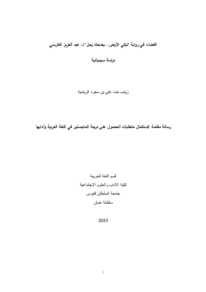Document
الفضاء في رواية "تبكي الأرض.. يضحك زحل" لـ: عبد العزيز الفارسي : دراسة سيميائية.
Source
رسالة ماجستير
Other titles
Space in the novel " Earth cries, Saturn laughs." by Abdul Aziz Al-Faresi, Semiotic study
Country
عمان.
City
مسقط
Publisher
جامعة السلطان قابوس
Gregorian
2023
Language
Arabic
Subject
Thesis Type
رسالة ماجستير
English abstract
The study attempts to determine the elements of the Space mentioned in the
novel "Earth Cries, Saturn Laughs" which was written by the Novelist, Abdul- Aziz
Al- Faresi, in addition to analyzing these elements Semiotically by establishing a
set of spatial polarizations and temporal paradoxes using the semiotic method
and the facilitated procedural tools in order to serve this research to come up
with an analytical interpretative work. This study will aim to reveal the indication
of the narrative space and its aesthetics, focusing on each component's
relationship with the other, and its impact on the course of the narrative. This
study will aim at revealing the significance of the narrative space and its
aesthetics, focusing on each element's relationship with the other, and its
impact on the course of the narrative, and above all, this study intends to apply
a scientific thoughtful approach in the scientific research, in addition to the
awareness of the richness of the Omani literature and the ability of processing
by the modern approaches.
This study is based on the research of problems related to the space of the
narrative in question and will focus on the possibility of researching the
connotations of narrative space in the light of the semiotic approach. The said
study will also examine the impact of the diversity of the narrative space during
the progress of the narrative within the novel: "Earth Cries, Saturn Laughs"
reaching the answer to the question: how can we matchmake between space as
a structure and space as a sign in the novel? The answer to these questions
necessitated the follow-up of the novelist's space in its variability and diversity
to explore its connotations and aesthetics.
The study is organized in the form of a preface, in which the meaning of the term
"space" and semiotic reading is discussed, then three chapters. The first chapter
was titled “The Narrative Place”, the second chapter discussed the semiotics of
the novelist’s time, and the third and final chapter dealt with the semiotics of
the novelist’s perspective.
The said study reached several findings, the most significant of which was that,
space in the novel "Earth Cries, Saturn Laughs" had been displaced from its
classical role which was limited to framing, as a structure, to other connotations
to be a sign representing a semantic focus in the narrative work. This was the
centerpiece around which the whole narrative was organized, generating many
spaces with semantic loads that contributed to the evolution and dynamism of
the narrator. In this sense, space represented both, structure and sign in the
same time. Thus, the novel's space is an extension of its various components,
which are reflected and identified in its different parts. Despite the diversity of
the spaces and their differences in the novel, they were systematically received
in an interconnected network of relationships, one of which rested only with the
other's presence. Events, places and personalities are time-bound, and these
constructive ingredients constitute an integrated, constructive and harmonious
meanings, through which the "Al- Faresi" was able to combine reality and fiction
through a delicate work of art controlled by expressive formats and pure literary
material. Narrative space gained its significance as a result of its fundamental
role in framing the storytelling material, and organizing the relations among the
different elements of narrative, thus generates the following through different
prospective: (the messenger): he is the narrator who manages and runs the
narrative by using the language as a means of imagination, (the message):
represented in the characters of the novel interactive in the events, then the
(receiver) or (the reader) who owns his own prospect and interpretive reading
in conceiving events and tracing their connotation
Category
Theses and Dissertations

